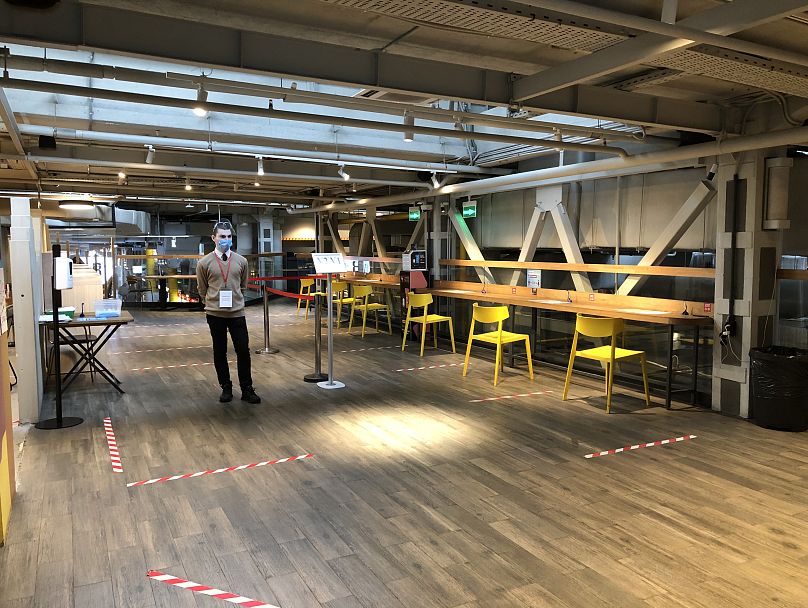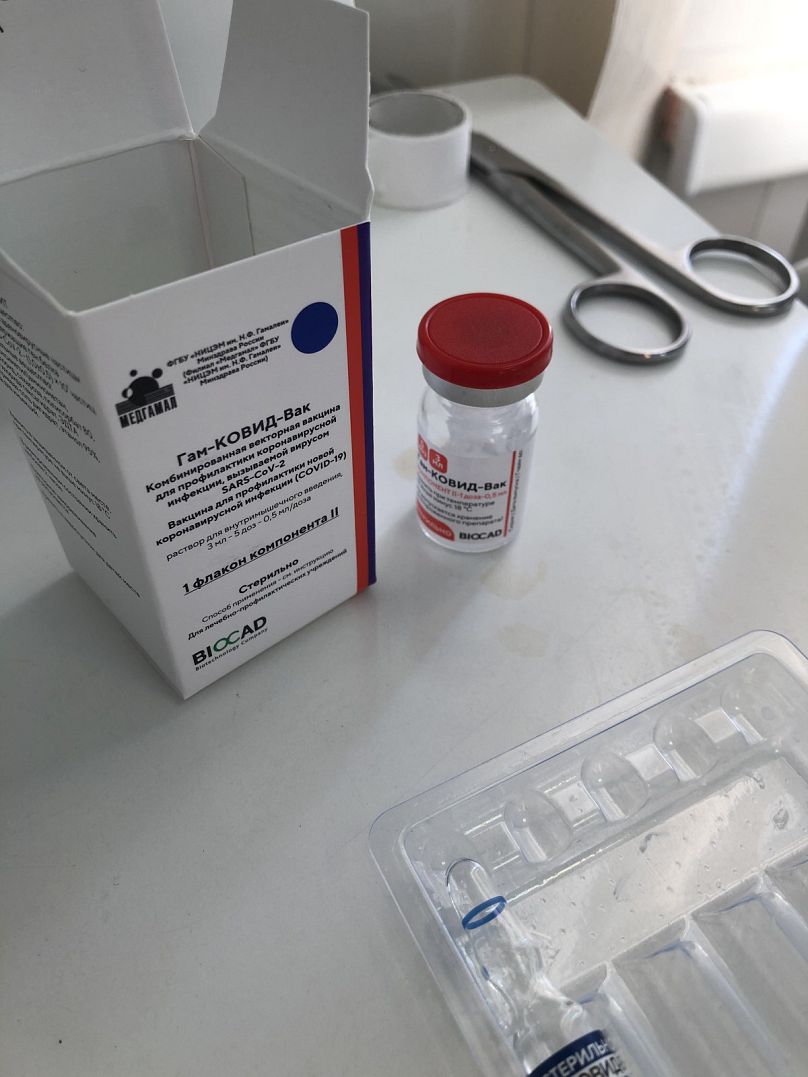Russian President Vladimir Putin said in March that just two million Russians had received both doses of the vaccine, representing less than 2% of the population.
All Russian citizens over the age of 18 are eligible to receive the Sputnik V COVID-19 vaccine but uptake appears to be low in the country.
 ADVERTISEMENT
ADVERTISEMENT
 ADVERTISEMENT
ADVERTISEMENT
Russian President Vladimir Putin said in March that just two million Russians had received both doses of the vaccine, representing less than 2% of the population.
By March 17, 5.5 million people had received at least one dose, according to Our World in Data, which would be roughly 3.81% of the population.
Vaccine hesitancy appears to be high with just 30% of people saying they would be "ready" to get the Sputnik V vaccine, according to polling by the Levada Centre, a Russian independent, non-governmental polling organisation.
That number was even smaller for people between the ages of 18 and 24, where just 19% said they wanted to get a jab. Among people over 55, the percentage was higher at around 40%.
Around 37% of respondents said that they were worried about side effects (in December, 29% had the same fears) and 30% said that they were waiting for final data about the vaccine. But around 16% said there’s no point in a vaccine against coronavirus.
Authorities are trying to incentivise people to get the vaccine. Amid the COVID-19 outbreak, students, disabled and the elderly had perks like free or cheaper public transport withdrawn, to stop people moving about as much. In December, Moscow mayor Sergey Sobyanin said these privileges would be reinstated for people who get both jabs.
At the beginning of the campaign, people even received an ice cream if they got a vaccine at one shopping centre.
How do Russians get a jab?
Citizens can choose a day and go to a “poliklinika” or polyclinic to receive a vaccine.
Polyclinics are free clinics for primary care and covered by the state. In Moscow, it is also possible to get an appointment for vaccination online, via a mobile app or by phone.
Everyone is checked out before getting a jab. Oxygen level, heart rate, and blood pressure are verified. You're asked if you have any allergies or illnesses.
After the vaccination, it’s recommended to stay in a hall for 30 minutes in case of any allergic reactions. There are two doses given between three weeks and two months apart. A three-week wait between jabs is more common.
In Moscow, you can even get the jab in a theatre or a food court. Mobile vaccination centres, usually situated in shopping centres, are also open every day and people do not have to make an appointment.
How does Sputnik V work?
Sputnik V is made up of two different human adenoviruses that have been modified to contain the gene that makes the spike protein of SARS-CoV-2, the virus that causes COVID-19.
According to the European Medicines Agency, which is currently reviewing the vaccine, "they cannot reproduce in the body and do not cause disease."
"The two adenoviruses are given separately: Ad26 is used in the first dose and Ad5 is used in the second to boost the vaccine’s effect," EMA says. The vaccine introduces the gene into the body's cells so they produce the spike protein.
The body then builds antibodies to fight the spike protein and later if they come into contact with the spike protein, the body will remember and fight it off.
The official vaccine website says it is 91.6% effective based on data from 19,866 volunteers who received both doses or a placebo.
What are the side effects?
After receiving the vaccine, Russians receive information about side effects which can include pain at the injection site, increased blood flow, swelling, chills, increased body temperature, slight cough, nasal congestion, arthralgia, muscle or joint pain, general malaise, and a headache.
"These symptoms should go away within three to four days after vaccination," the paper that comes with the vaccine states.
Many Russians discuss vaccination on Telegram to talk through their worries and share information about the vaccine. Russians who have been "chipped" which is how people refer to getting vaccinated, share information about their side effects.
The younger you are, the worse the side effects can be, experts say.
“I prepared all the necessary pills like aspirin just in case but I didn’t use them. I felt like I had 'a heavy head' and that’s it. Maybe I was just stressed. In the morning I felt absolutely fine, no pain, no fever,” said 76-year-old Nadezhda Tarasenko, who received both doses of the vaccine.
Olga Tkacheva, Director of the Russian Gerontological Research and Clinical Centre of Russia at the Ministry of Health said: "This can be explained by the fact that the immune system of a young person seems to flare up in response to the introduction of a foreign protein: once it has seen it, it instantly begins to fight it."
"With age, however, it has no such reserve, so there is obviously no such hyper reaction," she added.
Can a foreigner get vaccinated in Russia?
In late January, Rospotrebnadzor (Federal Service for Surveillance on Consumer Rights) head Anna Popova said that they were not planning to vaccinate foreigners and would give priority to Russian citizens.
But when contacted, two polyclinics said that vaccination is possible for a foreigner living in Russia if they have a health insurance card. One Moscow polyclinic contacted by Euronews said however that a Russian passport is needed to get a jab.
Andrei Sarana, deputy head of the St Petersburg Health Committee, also said in February, that only people who have a Russian passport can get a jab.
In the same interview, Sarana said that in Moscow only some diplomats could get vaccinated even though journalists from several foreign media said they had been able to get a jab.
Xavier Colás, the El Mundo correspondent in Moscow, and a Spanish citizen said he got a jab in January without any appointment.
“I took my passport and insurance. On the first day (of the vaccination campaign in this commercial centre), there was so much enthusiasm that I was not asked for insurance," he said.
Colás said he was not concerned about the vaccine.
"I calculated what could go wrong and I really saw no reason to be afraid. I also think that now the circumstances are special, so it means that even if we feel a bit of vertigo we have to overcome it, because on the other side COVID is a huge threat for health and for our way of life and economy," he said.
Valerian Jagouri, 42, is a Greek citizen. He has been living in Russia for the last 10 years. On February 1, he got his first jab in a shopping centre in Moscow.
"I was on my way to a shop to buy building materials, and on the third floor I saw girls inviting people to get vaccinated. I thought, why not, I can kill two birds with one stone. I showed my residence permit, but no one asked me for my health insurance card. I didn't even have it with me," he said.
The doctor asked Jagouri if he had any allergies or chronic illnesses, but didn't do a more thorough examination to check his blood pressure or heart rate.
Soon after the vaccination Jagouri had a fever of around 38 degrees Celsius and felt unwell but a day later, he felt better again.












